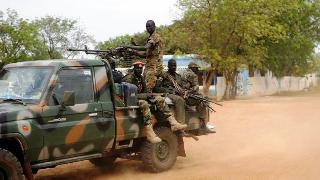UN says S. Sudan rebels “appear to be in control” of Malakal town
January 16, 2013 (JUBA) – Forces opposed to South Sudan government “appear to be in control” of Malakal, the Upper Nile state capital, a United Nations official said on Thursday.

He further said about 20,000 civilians were being protected at its base in the oil-rich state capital.
Security in the area has lately been tense after clashes between rebels loyal to the country’s former vice-president Riek Machar and pro-government forces with both sides claiming to have full control of the oil-rich territory.
An assessment report by the UN refugee agency (UNHCR) revealed very limited civilian movements in town while very few shops were reportedly opened for business.
UN PROTESTS RESTRICTIONS
Already, the mission has expressed concerns over restrictions allegedly imposed on the movement of ammunition for its troops.
“It [UN] reminds all parties that, as stated by the Security Council, efforts to undermine the mission’s ability to implement its mandate, as it seeks to protect civilians, will not be tolerated”, said Haq.
He reiterated the mission’s mandate to remain impartial and protect all civilians.
Despite all these challenges, however, the mission said security had been boosted in its bases across the country where some 65,000 civilians are currently seeking shelter.
Also undertaken, according to the mission, was thorough search for weapons by its police force, while additional police units authorized by the Security Council last December will arrive by the end of next week.
“These units will be deployed at bases in Juba, Malakal and Bentiu”, it said in a statement.
FIGHTING IN BENTIU
Meanwhile there were also reports of heavy shooting and shelling in Unity state capital on Wednesday as about 5,300 civilians sought shelter in two UN sites.
More than 200,000 South Sudanese have reportedly been displaced during the conflict, with nearly 80,000 said to have fled fleeing to neigbouring Uganda, Kenya, Ethiopia and Sudan.
(ST)
